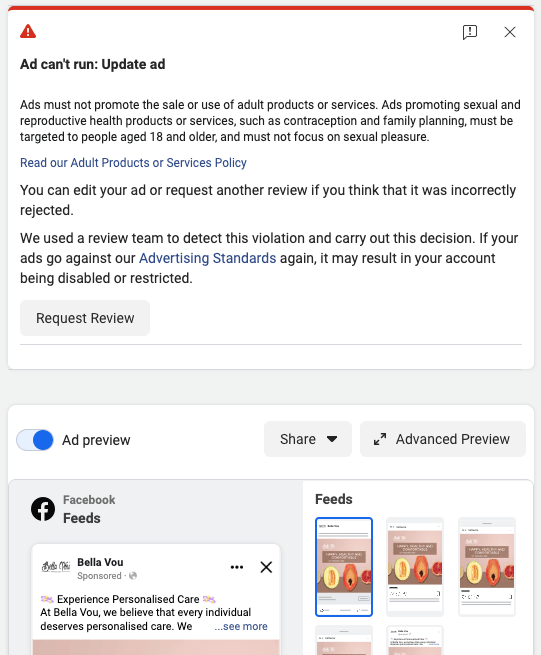Facebook, TikTok and Instagram community guidelines are creating giant hurdles for female self-care, fem-tech and cosmetic surgery brands - Bella Vou included! Recently, many of these brands have encountered blocks and restrictions when attempting to run ads or post valuable content on these platforms, raising concerns about the acceptance of women's health and wellbeing content on social media.
Several feminine-wellness brands have actively begun addressing roadblocks, hindering their ability to educate their communities about the valuable services and products they provide. Industry leaders have highlighted the inconsistent rules surrounding language related to women's health and wellness. Many social media managers within the health, wellness, and medical space face obstacles when using anatomically correct language - like ‘vagina’, ‘labiaplasty or ‘pelvic floor’ - and are even penalised when sharing censored images or illustrations containing as little as under-boob (can you tell by the frustration in our voice that this has happened to us before?!).
A quick Facebook or Google search reveals that the same restrictions do not apply to men's health products. Posts featuring language related to men's health, such as ‘scrotoplasty’, sperm or erectile dysfunction, do not face bans. These discrepancies in policy perpetuate existing disparities in healthcare faced by women's health companies, hindering their ability to innovate and educate in this field.
To avoid these restrictions, some brands have resorted to using outdated euphemisms like 'flower' or 'lady-garden,' but this approach is not only frustrating; it also perpetuates stigma around discussing important topics related to women's health. The inability to openly educate and destigmatise female anatomy becomes a challenge when the main goal is to promote awareness.

What's going on?!
Popular feminine health and hygiene brands, including Bella Vou, have experienced disapproval of these adverts and posts without clear explanations as to why or how advertising policies and community guidelines have been breached. Some have even faced temporary bans, unable to access their accounts for long periods of time.
It appears that social media bots are responsible for disapproving ads and flagging content, but a human can reverse their decisions. However, the subjectivity of the human moderator’s judgment and potential personal biases come into play. What is considered important information for women's health may be deemed inappropriate by a moderator who only focuses on aesthetic/sexual values or a narrow perspective.
Takeaways:
Social Media advertising policies have become obstacles for female self-care brands, raising questions about the acceptance and representation of women's wellness content on these platforms. The discrepancies in treatment between different products and the lack of nuance in their policies have caused frustrations and limitations for brands like Bella Vou and the vibrant communities that are eager to learn. The ongoing debate calls for more inclusive and understanding policies that recognize the importance of women's wellness and self-care. It is crucial to advocate for change that acknowledges the worth of women, including our wives, mothers, sisters and friends, in the digital space of the future.
Medically reviewed by
Last Updated: June 28, 2023
Published On: May 31, 2023
